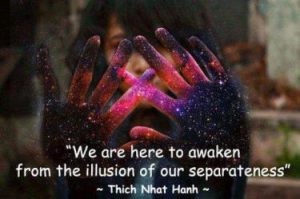I am fascinated by our current preoccupation with the Self, and how that will be challenged by the Anthropocene. This conception of the Self as separate from the natural world and from other beings has been disputed on a spiritual level likely since the emergence of philosophical and religious thought. Belief systems predicated around interconnectedness, reincarnation, and unity with nature still persist, and I believe are beginning to be reintroduced to cultures who had previously abandoned them in favor of individualism.
 I was excited to see this sense of universalism be supported in the scientific realm through the lens of Gaia Theory. Gaia Theory postulates that in fact we are all interconnected, as cogs in an integrated system. Just as the microorganisms that live in our stomach and on our skin are not necessarily “us” and yet are intrinsically inseparable from our being (as without us, their existence is impossible, and for the most part vice versa), so too is our relationship with theEarth and its components. Our individuality exists as a data point which necessarily links with all those surrounding to form the symbiotic web of our reality. We are because of our relationship with the whole, not in spite of it.
I was excited to see this sense of universalism be supported in the scientific realm through the lens of Gaia Theory. Gaia Theory postulates that in fact we are all interconnected, as cogs in an integrated system. Just as the microorganisms that live in our stomach and on our skin are not necessarily “us” and yet are intrinsically inseparable from our being (as without us, their existence is impossible, and for the most part vice versa), so too is our relationship with theEarth and its components. Our individuality exists as a data point which necessarily links with all those surrounding to form the symbiotic web of our reality. We are because of our relationship with the whole, not in spite of it.

Sara Schley and Karen Litfin both discuss the impact of this holistic identification in their pieces on sustainability and sacrifice, respectively. To know yourself as the other, to include within your identity beings outside of your immediate Self, is the key to achieving the sort of personal sacrifices necessary for increased sustainability. Sacrificing something for the preservation of another being, or for the system itself, is then a form of self preservation, not in spite of it. We must live from a perspective of abundance, not scarcity.
And give as though our lives depend on it.
Works Cited:
Liftin, Karen. The Sacred and the Profane in the Ecological Politics of Sacrifice.
Liftin, Karen. Thinking like a planet: Gaian politics and the Transformation of the World Food System.
Schley, Sara. Sustainability: The Inner and Outer Work. Oxford Leadership Journal, Issue 2, January 2011.
